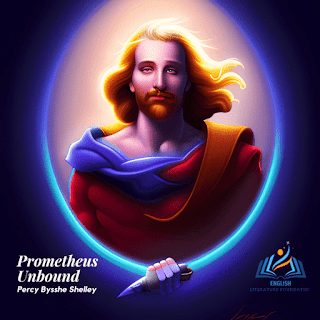"Prometheus Unbound" is a lyrical drama written by
the famous Romantic poet Percy Bysshe Shelley. It was first published in 1820,
and it tells the story of Prometheus, the Greek mythological figure who defied
the gods to give humanity the gift of fire.
Summary of the Play
Act I
The play opens with Prometheus, the Titan, being bound to a
rock on a mountaintop, where he has been punished by Jupiter for giving fire to
humanity. He is surrounded by the Furies, who taunt and torment him.
Prometheus's mother, the goddess Earth, laments his fate and calls upon the
spirits of the air to help free him.
The spirits arrive and inform Earth that Jupiter must be
overthrown before Prometheus can be released. They also introduce Asia,
Prometheus's beloved, who has been searching for him. Asia is a symbol of
compassion and love, and she represents the feminine aspect of nature. She
expresses her sorrow for Prometheus's suffering and her determination to help
him.
Act II
Asia and Prometheus reunite, and Asia tells him that she has
had a vision of his release. The two then express their love for each other,
and Prometheus explains that he has been punished for giving humanity
knowledge, which Jupiter believed would lead to their downfall. Prometheus is a
symbol of human intellect and creativity, while Jupiter represents oppressive
authority and tyranny.
Jupiter appears and demands that Prometheus reveal who will
overthrow him, but Prometheus refuses to betray the secret. Jupiter then
threatens to torture Asia, but she remains steadfast in her love for
Prometheus. Jupiter then departs, leaving Asia and Prometheus alone again.
Act III
In Act III, we see the downfall of Jupiter and the
liberation of Prometheus. Demogorgon, a mysterious figure, appears and summons
the spirits of the earth to help overthrow Jupiter. The spirits of the earth
represent the natural world and the power of life and growth. They destroy
Jupiter's palace and Jupiter himself is consumed by a cloud of fire.
Prometheus is then freed from his chains and he and Asia
celebrate their freedom and their love. They are joined by the spirits of the
air and the earth, who sing a hymn to the power of love and freedom.
Act IV
In Act IV, we see the rebirth of humanity and the promise of
a new age of freedom and creativity. The spirits of the air and the earth sing
a song of joy and hope, and Prometheus and Asia promise to use their newfound
freedom to create a world of beauty and harmony.
The play ends with a vision of the future, where humanity is
free from the tyranny of Jupiter and the power of love and creativity has been
unleashed. The message of the play is that humanity has the power to overcome
oppression and create a better world, and that love and compassion are the keys
to achieving this goal.
Act V
Prometheus is finally released from his bondage, and he and
Asia are reunited once more. Demogorgon appears once again, and he tells them
that Jupiter has been overthrown and that a new age of freedom and
enlightenment is beginning.
Analysis of the Play
"Prometheus Unbound" is a highly symbolic play
that explores several key themes, including the power of love, the struggle for
freedom, and the role of the individual in society.
The Power of Love
Throughout the play, the love between Prometheus and Asia is
depicted as a force that is stronger than even the power of the gods. It is
this love that ultimately leads to Jupiter's downfall and the liberation of
Prometheus.
The Struggle for Freedom
The play also explores the idea of rebellion against
oppressive authority, with Jupiter representing the tyrannical ruler who seeks
to maintain his power at all costs. The characters in the play symbolize the
struggle for freedom against this kind of tyranny, and their eventual victory
over Jupiter represents the triumph of the human spirit.
The Role of the Individual in Society
The play also touches on the role of the individual in
society, with Prometheus representing the archetype of the rebel who fights
against the status quo. The play suggests that individuals have the power to
bring about change and that their actions can ultimately lead to the overthrow of
oppressive regimes.
Conclusion
"Prometheus Unbound" is a powerful work that
explores some of the most fundamental themes of human

